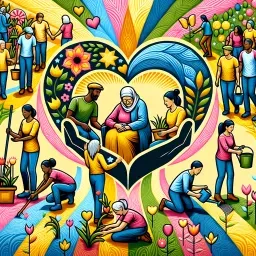”The very things that hold you
down are going to lift you up“

0
0
0
0
- Meaning
- The phrase signifies that obstacles can become sources of strength and motivation. It reflects philosophical concepts of duality, illustrating how negative experiences can lead to personal growth and upliftment. Psychologically, it embodies the idea of resilience and the strength drawn from adversity, suggesting that what initially seems burdensome may pave the way for future successes, echoing historical narratives of growth through hardship.
- Allegory
- The image elements reflect the phrase as follows: The phoenix symbolizes rebirth and rising from setbacks; the mountains represent challenges faced; the rainbow signifies hope and a bright future emerging from adversity; and the vibrant greenery embodies growth and resilience that comes from overcoming obstacles.
- Applicability
- In daily life, this phrase encourages us to view challenges as opportunities for growth. When faced with difficulties, one can adopt a mindset focused on learning and development, understanding that overcoming these challenges can lead to greater achievements.
- Impact
- This phrase has inspired countless individuals facing personal and professional challenges, contributing to the broader self-help and motivational movements. It serves as a reminder that struggles can lead to personal transformation, often quoted in contexts related to resilience and self-improvement.
- Historical Context
- The exact origin date of this phrase remains unclear, but similar sentiments have been expressed throughout history, particularly during the late 19th to early 20th centuries, when personal empowerment narratives became prevalent in American culture.
- Criticisms
- Critics might argue that the phrase oversimplifies the idea of hardship, suggesting that not all difficulties should lead to success or that it can place undue pressure on individuals to always respond positively to adversity. Some may argue that it neglects the systemic factors that affect people’s ability to rise from their struggles.
- Variations
- Variations of this phrase exist in various cultures, often highlighting the theme of growth through adversity. For instance, in Japanese culture, the saying "Nana korobi, ya oki" translates to "Fall down seven times, get up eight," emphasizing resilience similarly yet highlights a different cultural approach to perseverance.
-

The only limit is your soul.
-

For the strength of the Pack is the Wolf, and the strength of the Wolf is the Pack.
-

The problem is not the problem. The problem is your attitude about the problem.
-

You’re never too old to be young.
-

You don’t need a cape to be a hero.
-

It’s called love. It’s why we do it.
-

There are no accidents.
-

Venture outside your comfort zone. The rewards are worth it.
-

We scare because we care.
-

The sky’s awake, so I’m awake!
-

The public service is a public trust.
No Comments